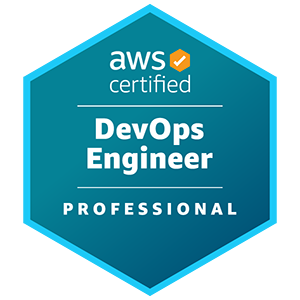Track
DevOps is a set of practices that coordinate software development and IT operations to deliver quality software products in a timely manner. There is an accelerated shift towards this field as it can speed up the process from application development to delivery.
Amazon AWS provides services and tools to simplify DevOps processes, and learning these enhances your credibility as a DevOps engineer.
This article explores everything about the AWS Certified DevOps Engineer—Professional Certification, such as the exam structure, how to prepare for it, and a suggested study plan with resources to ensure your success.
What is the AWS Certified DevOps Engineer – Professional Certification?
AWS Certified DevOps Engineer – Professional Certification validates a candidate’s technical expertise in deploying and operating distributed applications on the AWS platform.
The exam focuses on a range of DevOps concepts, such as infrastructure as code (IaC), monitoring and logging, security and compliance, and incident and event response. It also covers best practices for optimizing performance, cost, and reliability, ensuring candidates can handle real-world challenges in automating and maintaining AWS environments.
To earn this certification, candidates should deeply understand the development lifecycle and operations practices. This includes creating and maintaining continuous integration and continuous delivery (CI/CD) pipelines using AWS services like AWS CodePipeline, AWS CodeBuild, CloudFormation, and AWS Elastic Beanstalk.
Moreover, the certification tests the candidate's ability to monitor applications and infrastructure using tools like Amazon CloudWatch and implement adequate security controls.

If you're just starting or need an AWS refresher, consider enrolling in our Introduction to AWS course to build a solid foundation before tackling this advanced certification.
Exam Details and Requirements
Now, let’s review the AWS Certified DevOps Engineer – Professional exam, including its structure, content, and requirements.
Prerequisites
The AWS Certified DevOps Engineer – Professional exam is considered challenging and is not recommended for beginners.
I suggest previously earning either the AWS Certified Solutions Architect—Associate or AWS Certified Developer—Associate certification. Additionally, hands-on experience managing AWS resources and implementing DevOps practices on AWS is important for success.
Exam structure
The exam consists of 65 scored questions and 10 unscored questions, for a total of 75 questions. The unscored questions are included to help AWS improve future exam versions, but they do not affect your score. You will have 180 minutes to complete the exam.
The questions are divided into two types:
- Multiple choice: Select one correct answer from several available choices.
- Multiple response: Select two or more correct answers from several options.
There is no penalty for incorrect answers, so it is recommended to attempt every question.
Exam cost: 300 USD
Domains covered
The exam questions are structured around six primary domains. The domains and their weight are detailed below:
|
Domain |
Weight |
Content |
|
SDLC Automation |
22% |
|
|
Configuration Management and IaC |
17% |
|
|
Resilient Cloud Solutions |
15% |
|
|
Monitoring and Logging |
15% |
|
|
Incident and Event Response |
14% |
|
|
Security and Compliance |
17% |
|
AWS Cloud Practitioner
How to Prepare for the Exam?
Follow the steps and resources below to increase your chances of becoming an AWS Certified DevOps Engineer.
Step 1: Understand the exam blueprint
Before signing up for the exam, you should do your research about the certification and exam details. Reading this blog post is a great start!
The AWS DevOps Engineer certification can be taken either at a testing center or online with a proctor, so you can choose the option that best suits you.
The above sections already discuss exam structure, question types, and cost—go through them thoroughly beforehand. For more information, you can always visit the official AWS website.
Step 2: Gain hands-on experience
Gaining hands-on experience is key to passing the exam. Work on AWS DevOps projects such as:
- Code integration and deployment using CI/CD pipelines on AWS CodePipeline, AWS CodeBuild, and AWS CodeDeploy.
- Setting up an alert and monitoring system for an application using Amazon CloudWatch.
- Creating a serverless application using AWS Lambda.
In addition, you should practice enough on the AWS platform with similar question types and difficulty levels to get comfortable with the exam environment. The following sections provide guidance on where to find practice questions and mock tests.
In addition to DevOps skills, you’ll need to deeply understand AWS services to better your chances of getting certified.
Step 3: Use online courses and tutorials
Many online courses cover the exam syllabus and required topics in detail. AWS also offers an official course related to DevOps engineer certification. The course contains video lessons and relevant practice questions in each module.
On DataCamp, the AWS Cloud Practitioner skill track can help you build the necessary knowledge and expertise to prepare for the certification. You can also check out this DevOps Concepts course for additional in-depth coverage of essential DevOps topics.
Step 4: Practice with mock exams
Taking exam-simulated mock tests and practice mode questions is a step you shouldn’t ignore in your preparation. Mock exams help you assess your strengths and weaknesses, measure your preparation level, and refine your time management skills.
AWS offers an official set of practice exercises that replicate the questions you'll encounter in the exam. Make sure to utilize these resources to enhance your readiness.
Suggested Study Plan
Preparing for the AWS Certified DevOps Engineer – Professional exam typically takes around 8 weeks, allowing you to cover the entire syllabus and practice a sufficient set of questions.
Since most online courses are structured according to exam domains, you can dedicate each week to completing a specific domain. A detailed study plan is outlined below:
|
Week |
Study subjects |
|
Week 1: Domain 1 - SDLC Automation |
|
|
Week 2: Domain 2 - Configuration Management and IaC |
|
|
Week 3: Domain 3 - Resilient Cloud Solutions |
|
|
Week 4: Domain 4 - Monitoring and Logging |
|
|
Week 5: Domain 5 - Incident and Event Response |
|
|
Week 6: Domain 6 - Security and Compliance |
|
|
Weeks 7 & 8: Practice and Review |
After covering all the domains, the next two weeks should be focused on practice tests and review.
|
The final phase is important to retaining the information you’ve learned and ensuring your confidence in all aspects of the exam syllabus.
Tips for Success on Exam Day
Preparing thoroughly for the AWS Certified DevOps Engineer – Professional exam is very important, but your approach on the day of the exam can significantly impact your performance.
Here are some of my best tips to help you succeed:
1. Manage your time effectively
With 75 questions to answer in 180 minutes, time management is key.
- Skim and mark: Quickly skim through each question. If you're uncertain about an answer, mark it for review and move on. This strategy helps maintain momentum and ensures you address all questions.
- Prioritize known questions: Answer questions you're confident about first. This builds confidence and secures easy points early on.
2. Read questions carefully
AWS exam questions can be complex and detailed.
- Identify keywords: Look for keywords that indicate specific AWS services or concepts. For example, terms like "real-time" might point toward Amazon Kinesis.
- Understand the scenario: Ensure you understand the scenario presented before evaluating the answer choices.
3. Eliminate incorrect options
When unsure, use the process of elimination.
- Narrow down choices: Eliminate obviously incorrect answers to improve your chances of selecting the correct one.
- Trust your preparation: Rely on your knowledge and intuition, especially when choices seem similar.
4. Stay calm and focused
Easier said than done! But maintaining composure is vital.
- Take deep breaths: If you feel anxious, pause and take a few deep breaths to regain focus.
- Stay positive: Keep a positive mindset throughout the exam.
5. Utilize the review feature
Make use of the exam's review functionality.
- Review marked questions: After completing all questions, revisit those you've marked for review. Sometimes, later questions can provide hints or jog your memory.
6. Prepare logistically
Ensure all logistical aspects are in order.
- Arrive early: If taking the exam at a testing center, arrive early to settle in and reduce stress.
- Check equipment: For online proctored exams, test your equipment beforehand to avoid technical issues.
7. Rest and nourish
Your physical state affects your mental performance.
- Get adequate sleep: Ensure you have a good night's sleep before the exam day.
- Eat well: Have a balanced meal before the exam to maintain energy levels.
These strategies can enhance your performance and increase your chances of success on the AWS Certified DevOps Engineer – Professional exam!
Conclusion
Achieving the AWS DevOps Engineer certification equips you with the hands-on experience required to advance your career in the field. Not only will you gain knowledge in the process, but it is also valuable to your resume—employers will recognize it during salary negotiations, promotions, or when considering candidates for new roles!
If you're starting your AWS journey or looking to build a solid foundation, explore these additional resources to help you prepare:
- AWS Cloud Practitioner CLF-C02 Track: Learn the foundational aspects of AWS, which is a great starting point for beginners.
- AWS Cloud Technology and Services Course: Understand AWS cloud technology and services in-depth.
- AWS Security and Cost Management Course: Gain insight into AWS security best practices and cost management techniques.
Good luck, and remember—certification is just the beginning. Keep building, experimenting, and advancing your skills on AWS!
Cloud Courses
FAQs
Is being an AWS Certified DevOps Engineer Professional worth It?
The AWS DevOps Engineer Professional certification is an advanced level certification, so it adds tremendous value to your resume.
Which certification is best for DevOps engineers?
The AWS Certified DevOps Engineer - Professional certification, Microsoft Certified: Azure DevOps Engineer Expert, and Docker Certified Associate (DCA) are the top 3 certifications for DevOps engineers.
What is the passing score for an AWS Certified DevOps Engineer Professional?
The minimum score for passing AWS DevOps Engineer Professional certification is 750 out of 1000.
What is a DevOps engineer's salary?
According to Glassdoor, the average pay for DevOps engineers in the USA is $107,991 per year.
Srujana is a freelance tech writer with the four-year degree in Computer Science. Writing about various topics, including data science, cloud computing, development, programming, security, and many others comes naturally to her. She has a love for classic literature and exploring new destinations.
